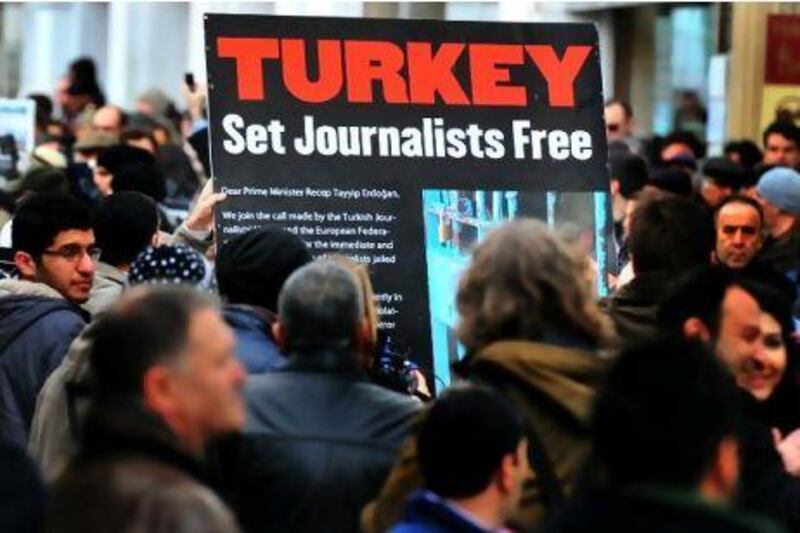ISTANBUL // The arrest of several Turkish journalists accused of taking part in a coup attempt may undermine the credibility of an unprecedented effort to bring the plotters to justice, observers say.
Yesterday, a court in Istanbul ordered four journalists of a website critical of the government, as well as a writer to be remanded in custody. Last week, the prominent journalists Nedim Sener and Ahmet Sik were also jailed. All are accused of membership in Ergenekon, a right-wing organisation that prosecutors say has plotted to bring down the government by force.
Sahin Alpay, an academic and columnist for the pro-government newspaper Zaman, called on prosecutors to give detailed reasons for the arrests as soon as possible. "Otherwise, claims that the Ergenekon trial is 'being used to silence the opposition media' will gain validity," Mr Alpay warned.
After a warning by Turkey's president and criticism by Turkish media, the EU, and human rights activists, Sadullah Ergin, the justice minister, distanced himself from the arrests. It was too early to comment on the reasons for the arrests, the minister told the Turkish news channel NTV. But he added: "If [the accused] have been taken in only because of their journalistic work, it would be a coup against the press."
In a statement released in Istanbul on Sunday, Zekeriya Oz, the Istanbul prosecutor leading the Ergenekon investigation, denied that the arrests of Mr Sener and Mr Sik were related to "their journalistic work, their writings or their planned writings or books". Mr Oz declined to give detailed reasons, citing the confidentiality of his investigation.
Mr Oz says Ergenekon, a suspected network of military officers and civilian nationalists, plotted to bring down the religiously conservative government of Recep Tayyip Erdogan, the prime minister. Although Mr Oz started his investigation in 2007 and more than 270 suspected Ergenekon members have been brought to court, there have been no convictions.
The probe into Ergenekon, named after the mythical home of Turks in Central Asia, as well as investigations against several other suspected coup plotters in the armed forces, are major developments for Turkey. The country has seen four governments pushed from power by the generals since 1960.
Some critics of Mr Erdogan say the investigations are part of a campaign to discredit the strictly secular military, orchestrated by the government, which is run by devout Muslims like Mr Erdogan himself. But supporters of Mr Erdogan as well as many independent journalists, liberals and intellectuals have welcomed the investigations as part of an overdue process of strengthening democracy, the rule of law and civilian control over the armed forces.
With the arrest of Mr Sener and Mr Sik, that perception has taken a severe hit, because both have been known as critics of the suspected coup plotters. Mr Sener, a reporter for the Milliyet daily, told prosecutors he had been threatened by Ergenekon suspects himself, newspapers reported yesterday. Mr Sik, a freelancer, is credited with being one of the first Turkish journalists to unveil suspected coup plans.
Commentators have speculated that the arrest of the two reporters may have been an effort to silence them because they were also known for criticising the police. Mr Sener has published a book dealing with shortcomings of the security forces in the murder of Hrant Dink, a Turkish journalist of Armenian descent who was gunned down by a nationalist in Istanbul in 2007. Mr Sik has been working on a book about what he regards as a growing role of an Islamic movement in the police force.
"Journalism itself has been detained," ran the headline of the opposition newspaper Cumhuriyet yesterday. After the arrests, journalists staged protest marches in Istanbul, Ankara and Izmir. Abdullah Gul, Turkey's president, told Milliyet he was "concerned" and that he expected judges and prosecutors to "act with more sensitivity".
The EU also said it was following developments "with concern", and Human Rights Watch said the arrests would have "a chilling effect on free speech" in Turkey. The arrests were "a disturbing development", Emma Sinclair-Webb, Turkey researcher at Human Rights Watch, said in a statement. "It raises concerns that what is now under investigation is critical reporting rather than coup plots."
The arrests have shocked those parts of the public that have been supportive of the Ergenekon investigation so far. Hasan Cemal, a leading Milliyet columnist and a prominent supporter of steps to prevent further military coups in Turkey, called the arrests a "blow against press freedom".
[ tseibert@thenational.ae ]






